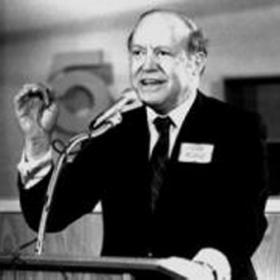John Kluge ranked as one of the least known but most powerful moguls in the modern television industry in the United States as Chairman of the Board for Metromedia International Group.
Born in Chemnitz, Germany, in 1914 John Kluge served in U.S. Army intelligence, 1941-45 after Immigrating to U.S. in 1922. Kluge proved a group of independent TV stations could make millions of dollars. His Metromedia, Inc. pioneered independent stations operations through the 1960s and 1970s. In the mid-1980s Rupert Murdoch offered Kluge nearly $2 billion for the Metromedia stations, which then served as the basis for Murdoch's FOX television network. This deal made Kluge one the richest persons in the United States.
It was the food business that led Kluge to television. In 1951 he invested in a Baltimore, Maryland food brokerage enterprise, increased sales dramatically, sold his majority stake in the mid-1950s, and began to look for another industry that was growing. He found television. In 1956 Kluge was too late to enter network television, but saw possibilities with independent TV stations. He assembled an investment group and purchased the former DuMont stations. He ran Metromedia on a tight budget, saving rent, for example, by headquartering the company across the Hudson River from New York City, in Secaucus, New Jersey. He seized upon the programming strategy of simply re-running old network situation comedies and low budget movies. And Metromedia made millions with relatively small audiences, because costs of operation were so low.
Under his stewardship, Metromedia grew into the largest independent television business in the United States. Thereafter Kluge purchased assorted businesses to add to his Metromedia empire. Over the years he acquired the Ice Capades, the Harlem Globetrotters, music publishing companies holding such titles as Fiddler on the Roof, Zorba the Greek, and Cabaret, television production and syndication units, Playbill magazine, and a highly profitable direct mail advertising division. But he did make mistakes. One disastrous misstep was Kluge's 1960s purchase of the niche magazine Diplomat; another came with his proposal for a fourth TV network. Neither project succeeded, nor the failures cost Metromedia millions of dollars.
Kluge reached his greatest successes in television by buying the syndication rights to M*A*S*H. With this asset he finally gave rival network affiliates a contest for ratings in the early fringe time period. Not one to sit still, during the early 1980s Kluge cooked up a deal to take Metromedia private. In 1984, by structuring a $1.3 billion leveraged buyout on unusually favorable terms, Kluge ended owning three-quarters of the new company and pocketing $115 million in cash in the process. Now private and in full control, Kluge did not hesitate when Rupert Murdoch approached him with $2 billion to buy Metromedia's television stations.
Out of TV, Kluge attended to his other businesses. Under the Metromedia name, he began to manufacture paging devices and mobile telephones. In managing these telecommunication ventures, Kluge retraced the steps he took in his television career: buy a license in a major market at an affordable price, then wait as the market evolves, and finally cash in.
In 1995 the Actava Group Inc., Orion Pictures Corp., MCEG Sterling Inc. and Metromedia International Telecommunications Inc. signed an agreement to form a global communications entity to be named Metromedia International Group Inc. Kluge already owned a major stake in Hollywood's Orion Pictures. The new four-part alliance merged wireless cable and Hollywood production skills to sell all forms of mass communication to citizens in Eastern Europe and the former Soviet Republics.
Kluge attended Wayne State University, Detroit, Michigan, and earned a B.A. in economics, Columbia University, 1937
John W. Kluge passed away on September 7, 2010, and is deeply missed by all at EWI.
Click here to read a tribute to John W. Kluge from EWI President and CEO John Edwin Mroz.

